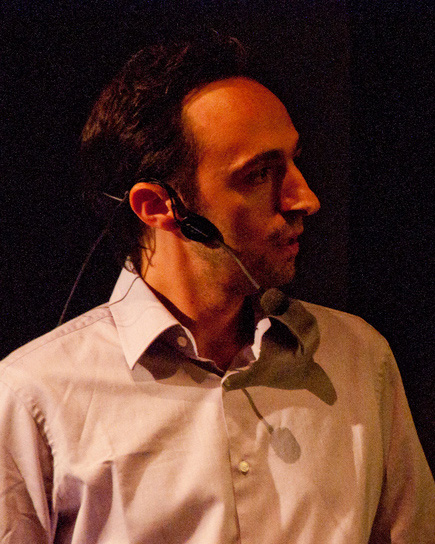Invited Speakers
 |
Dr. Chris WeltyIBM T.J. Watson Research Center
|
Abstract
Knowledge is not the Destination: IBM's Watson and the evolving role of semantic technologyIn the traditional vision of AI, understanding flowed from perception through language to knowledge. It had always been envisioned that this understanding would be in some precise and unambiguous knowledge representation, and that all meaning processing would happen in this representation. This is the root of all semantic technology today. However, over time, the failure of the AI community to achieve this end-to-end vision made many, especially those in NLP, question the endpoint, in other words, to doubt the value of semantic technology. In this talk, we show that it was the vision, not the technology, that deserved to be doubted: semantic technology has significant value in accomplishing tasks that require understanding, but it is not the endpoint.
Chris Welty is a research scientist at the IBM T.J. Watson Research Center in New York. Before coming to IBM, he taught computer science at Vassar College and at Rensselaer Polytechnic Institute, where he received a Ph.D. in 1995. Before moving to industrial research, he accumulated more than 14 years of teaching experience. Dr. Welty has worked to advance semantic technology standards, and the use of semantic technology and linked open data in natural language processing. The most notable examples of this are in the Watson Question-Answering system itself, which uses RDF and Linked Data extensively. He has also served this community as co-chair of the W3C Rules Interchange Format Working Group (RIF), co-editor of the original OWL Guide, co-program chair of ISWC-2011, and the AI&Web track of AAAI-12. He is the current Human Language Technologies Area Editor for The Journal of Web Semantics. Before the success of the Watson project, Dr. Welty was best known for his work on Ontologies, where he co-developed the Ontoclean methodology with Nicola Guarino. OntoClean was the first formal methodology for analyzing ontologies. He has served this community on the steering committee of the Formal Ontology in Information Systems Conferences, and as past president of Principles of Knowledge Representation and Reasoning, Inc. He is on the editorial boards of AI Magazine, and The Journal of Applied Ontology.
 |
Dr. Georgios N. YannakakisIT University of Copenhagen
|
Abstract
Game AI Is Dead - Long Live Game AI!More than a decade after the early research efforts on the use of artificial intelligence (AI) in computer games and the establishment of a new AI domain the term ''game AI'' needs to be redefined. Traditionally, the tasks associated with game AI were revolved around non player character (NPC) behavior at different levels of control, varying from navigation and pathfinding to decision making. Commercial-standard games developed over the last 15 years and current game productions, however, suggest that the traditional challenges of game AI have been well addressed via the use of sophisticated AI approaches, not necessarily following or inspired by advances in academic practices. The marginal penetration of traditional academic game AI methods in industrial productions has been mainly due to the lack of constructive communication between academia and industry in the early days of academic game AI, and the inability of academic game AI to propose methods that would significantly advance existing development processes or provide scalable solutions to real world problems. Recently, however, there has been a shift of research focus as the current plethora of AI uses in games is breaking the non-player character AI tradition. A number of those alternative AI uses have already shown a significant potential for the design of better games. In this talk, I will present two key game AI research areas that are currently reshaping the research roadmap in the game AI field and evidently put the game AI term under a new perspective. These game AI flagships include the computational modeling of player experience and the procedural generation of content.
Georgios Yannakakis is an Associate Professor at the IT University of Copenhagen. He received both the 5-year Diploma (1999) in Production Engineering and Management and the M.Sc. (2001) degree in Financial Engineering from the Technical University of Crete and the Ph.D. degree in Informatics from the University of Edinburgh in 2005. Prior to joining the Center for Computer Games Research, ITU, in 2007, he was a postdoctoral researcher at the Mærsk Mc-Kinney Møller Institute, University of Southern Denmark. His research interests include user modeling, neuro-evolution, computational intelligence in computer games, cognitive modeling and affective computing, emergent cooperation and artificial life. He has published over 90 journal and international conference papers in the aforementioned fields. He is an Associate Editor of the IEEE Transactions on Affective Computing and the IEEE Transactions on Computational Intelligence and AI in Games, and the chair of the IEEE CIS Task Force on Player Satisfaction Modeling.
 |
1992-2012: Twenty years bachelor and master Knowledge Engineering |
Main Sponsor
 |
Sponsors
 |
 |
 |
 |
 |
 |
 |

|  |
 |
|
* The IBM logo is a registered trademark of International Business Machines Corporation (IBM) in the United States and other countries and is used under license. IBM responsibility is limited to IBM products and services and is governed solely by the agreements under which such products and services are provided
